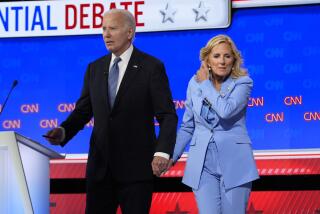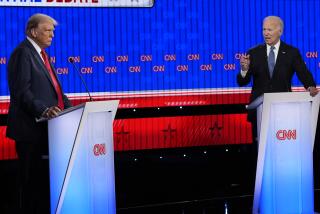Berlusconi May Not Survive Vote
- Share via
ROME — He smiled down at the adoring crowd, flashing a row of teeth so white they could blind. As his fans chanted his name, waving red and green flags, Silvio Berlusconi demanded they follow him “across the river to freedom.”
They sang “Forza, Italia,” or “Go, Italy,” the name of his party, and jeered and hissed every time he mentioned the left-leaning opposition.
“People would be masochistic not to vote for us,” he said.
And so Berlusconi, the prime minister of Italy, wrapped up one of his final campaign rallies at the Rome fairgrounds.
But around the corner, Tiziana Lepreso was not impressed. A 39-year-old supermarket checkout clerk, Lepreso has seen her buying power plummet and her benefits slashed.
“Everyone expected so much from Berlusconi,” Lepreso said. “It didn’t work.”
Today and Monday, Italians will vote in a national election that has Berlusconi, 69, fighting to keep his political career alive.
More than crucial domestic issues, the election is about Berlusconi, a billionaire tycoon and the longest-serving prime minister in post-World War II Italy, whose ability to run the country is increasingly being called into question.
Campaign rhetoric has been strident. Berlusconi, who is Italy’s richest man, regularly boasts of his friendship with President Bush, and he is attempting to marshal the public’s fears by painting the opposition as dangerous communists who would raise taxes and open the floodgates to Muslim immigrants.
His opponent, Romano Prodi, 66, a professorial economist and former president of the European Commission, portrays Berlusconi as an unmitigated disaster who has single-handedly run Italy’s stagnant economy into the ground.
Berlusconi leads a coalition of centrist and right-wing parties that has governed for five years, while Prodi’s disparate center-left coalition includes parties ranging from Catholics to communists.
Given Berlusconi’s famous charm, endless braggadocio, wealth and control of most media -- his companies own newspapers and most of the nation’s private television stations -- he ought to have the election in the bag. Instead, Prodi, a former prime minister, has been slightly ahead in polls despite a rather passionless campaign.
Berlusconi’s once-endearing antics “have worn thin,” said Sergio Romano, a prominent political analyst. “He will do anything to get a vote. But by now, some of his comments are such obvious exaggerations that the people are getting tired. There is real wear and tear.”
Italians who have observed Berlusconi since he burst into national politics 12 years ago note that his campaign has become faintly anarchic. The prime minister has made statements wild even by his standards: Trying to cast aspersions on his leftist opponents, Berlusconi told voters that Chinese communists used to boil babies and use them as fertilizer. (Beijing was not amused.)
He is bickering with his natural allies, including once-loyal industrialists who got rich alongside him. Two Cabinet ministers have had to resign in disgrace in recent weeks, and he was remarkably unprepared for a debate on television, a medium he virtually has personified.
In an incident that Italians are still talking about, he stormed off the set of a live TV interview with one of the country’s best-known journalists, incensed by her persistent questioning.
Even a newspaper friendly to Berlusconi and partly owned by his family questioned outbursts by the prime minister, who is nicknamed Il Cavaliere, or the Knight.
“The Knight is now tilting at windmills, and the outcome of wars against windmills is well known. Knights generally succumb,” editorialized the daily Il Foglio.
But Berlusconi says he remains confident of victory. And, in fact, pollsters caution that the race is very close.
The prime minister should benefit from the fact that he and his associates own or control most of Italy’s broadcast media, the most influential form of communication in the country. (One of his companies, which owns three TV channels, has been fined three times in three weeks for violating equal-time laws by giving too much coverage to him.)
Still, Italy’s economic malaise and an increasingly squeezed middle class continue to weight Berlusconi down. He came to power promising to run the country like he ran his companies, spreading prosperity for all. Instead, most Italians feel less well-off than they did five years ago, polls indicate.
Italy registered no economic growth last year and has run below the average for Europe for 13 of the last 14 years. Growth has averaged less than 1% annually during Berlusconi’s five years in power.
Yet Berlusconi has refused to acknowledge a problem, adding to the public disappointment in him. He stunned an audience of the country’s top businessmen last month when he told them economic troubles were the fantasy of pro-left newspapers.
“Open your eyes,” he said. “Where is the crisis?”
Most of Berlusconi’s exchanges with Prodi have been vitriolic.
Berlusconi calls his opponents “weeds.” Prodi says he is up against “criminal delinquents.” In their second and final televised debate, Prodi told a number-spouting Berlusconi that he was relying on questionable statistics the way a “drunkard leans on a lamppost.”
Berlusconi retorted that Prodi was a “useful idiot” and “front man” for evil communists.
The next day, the prime minister went a step further, or lower, using a vulgar word for part of the male genitalia to characterize Italians who vote for the opposition.
Prodi, meanwhile, faltered when he failed to quickly clarify his plans to raise taxes. Eventually, he said he planned to reinstitute the inheritance tax, which Berlusconi’s government did away with, but only for the very rich.
Berlusconi used the final minute of his last TV debate with Prodi to announce that he would repeal an unpopular tax on homes. The timing gave Prodi no time to respond. Berlusconi’s opponents later called the offer demagogic because cutting the tax would bankrupt Italy’s cities. Still, it is expected to appeal to some voters.
Prodi, who served as prime minister from 1996 to 1998, stressed his credibility and maturity.
“I think Italians have the right to judge us according to our proposals, according to the government team we offer them and according to our personal credibility, and not for the manner [in which] we raise our voices,” he said.
One issue that has not figured in the race is the war in Iraq. Berlusconi ignored broad popular opposition and committed Italian troops there after the U.S.-led invasion.
But he has already announced plans to withdraw them by year’s end, and Prodi said last week that he too would bring the Italian contingent home, “as soon as possible.”
The issue of immigration is gaining only limited traction, probably because neither the right nor the left is seen as having policies that would fundamentally alter the influx of foreigners.
Berlusconi has pledged that he would not permit Italy to become “multiethnic.” Prodi’s platform includes repeal of a new immigration law that makes it more difficult for foreigners to obtain work permits.
Even on the economy, platforms are vague on both sides, and neither candidate is offering the hard-nosed, politically risky program of reform that economic analysts say will be needed to rescue Italy’s economy from the doldrums.
“Italy is in decline, like Venice at the end of the 18th century. It’s a jolly sunset, but it’s a sunset nonetheless,” said Beppe Severgnini, a social commentator and author of “La Bella Figura: A Field Guide to the Italian Mind.”
“This is a very sad campaign. The choice for Italians is between a disaster if Berlusconi stays, and a huge question mark if he goes.”
More to Read
Sign up for Essential California
The most important California stories and recommendations in your inbox every morning.
You may occasionally receive promotional content from the Los Angeles Times.














